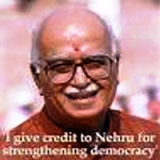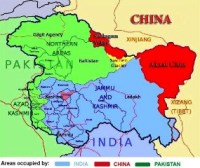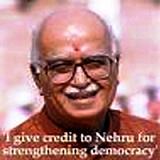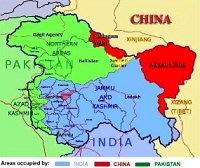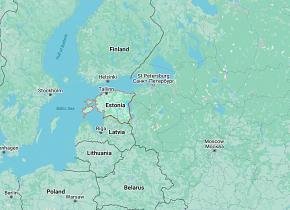Independent Kashmir -- Only Viable Solution
India and Pakistan, both nuclear powers now, fought three full-scale wars in the past using conventional weapons having little political impact or concern bilaterally or on international level. Analyzing the current balance of military strength in conventional weaponry, Pakistan admits the disadvantage it has and accepts the disparity to match India’s accumulated stockpile of military hardware. Under the circumstances, it is not difficult to assume the option Pakistan has in case of some overt or covert military adventure by India. It may be recalled that India in the recent past has been hinting at "surgical strikes or limited operation" which can have dangerous and perilous consequences for the whole region. India´s TV channel "AajTak" reports (July 10, 2012) that India and China are on the war-path having regular border skirmishes which should be an indicator to judge that India has problems with more than one nuclear neighbour. Even Indian army generals have indicated to take on China and Pakistan simultaneously which is a very scary scenario and must be considered very seriously on the international level.
The successive governments and the political parties of India and Pakistan since 1947 emotionally charged up innocent populace to keep control over the political power and make Kashmir a scapegoat to fulfil such an agenda. Kashmir has had to pay a huge price in terms of men and material, even though Kashmir prior to British exit from Indian sub-continent was a sovereign independent nation having scant administrative connection with British India. Her Majesty´s Government, on receiving complaints of misrule and brutality, had appointed a Resident to oversee and keep an eye on the running of the despotic regime of Maharaja in Kashmir.
L K Advani, leader of India's Hindu fundamentalist BJP (Bhartiya Janata Party) PTI July 09, 2012, threatens to launch agitation for any attempt made by government of India to reverse the "process of Kashmir integration" with India. Though the initial plan of involving stage managed "interlocutors" was a conspiracy hatched to ward off the pressure government of India faced on international level when in 2010 more than one hundred fifty stone pelting youth of Kashmir were brutally annihilated. Kashmir, as the world knows, has world's largest military concentration, keeping in view the population ratio, India uses sophisticated modern killing machines to confine people of Kashmir behind their doors and till today has managed this part of the agenda successfully. India got unnerved when more than two million people marched towards United Nations Office at Gupkar Kashmir to handover the list of Indian atrocities, reminding UN of its bounden duty to play the role of implementing numerous UN Resolutions on Kashmir. Advani once again reminded India’s imposed Chief Minster in Kashmir Omar Abdullah parroting the favourite phrase that "Kashmir is an integral part of India".
India in a brazen and arrogant manner with utter disregard for human-rights and democratic norms continues its hegemony and atrocities on people of Kashmir which go unnoticed and must be stopped forthwith. A revealing one hour documentary titled KASHMIR’S TORTURE TRAIL directed by Jezza Neumann shown on BBC´s Channel 4 on July 10, 2012 is an eye-opener and exposes Indian lies by giving an account of Indian occupation committing widespread monstrosity on the people of Kashmir. The documentary can be watched at -- http://www.channel4.com/programmes/kashmirs-torture-trail
On the same day The Guardian UK published a detailed report of human right violation in occupied Kashmir. The details can be perused at: http://www.guardian.co.uk/world/2012/jul/09/mass-graves-of-kashmir.
Pakistan with political uncertainty, endemic corruption culture and neighbouring Afghanistan a hotbed of international meddling with vested political and economic interests involving USA and India particularly has put Pakistan in a quandary and to face the dilemma, it seems, is beyond its control. Pakistan in this situation is perhaps devoid of ideas to find a solution as it is faced with a direct dealing with NATO alliance and one wrong step would mean a further economic disaster which it cannot afford. NATO alliance needs to tread carefully and not push Pakistan too hard as it, needless to say, can again lead to disastrous consequences.
The world powers are convinced that Afghanistan cannot be stabilised if Pakistan is unstable and in this regard every effort must be made to help Pakistan consolidate its position politically and economically so that it plays its role without any hindrance to deal with the menace faced by the international community. To create an atmosphere in Pakistan-India relations conducive to lessen tensions and aspect of volatility Kashmir problem needs to be resolved.
The human problem of Kashmir divided by occupation is causing hardships to the entire populace and loss of life, property and resultant psychological problems has taken a big toll. Pakistan and India agree that they cannot possibly wrest by force the part held by the adversary and maintaining a status quo cannot continue for ever. The opinion on both sides is building up to correct the wrongs of the past as enough blood spilled and overall destruction resulting in economic hardships for common people can only multiply with no tangible outcome. An amicable solution brokered with the help of international community and United Nations can save billions of dollars for both India and Pakistan. The money spent on running the race to acquire military, nuclear and missile superiority can be used to uplift the poor masses to live a better life. Pakistan is poor but India is not rich either as the huge population lives below subsistence level or the ratio simply goes up adding one Australian population figure to India’s every year.
An independent Kashmir can guarantee peace and sentimentally charged up people on both sides will not feel a sense of pessimistic resignation or defeatism. A free Kashmir with international guarantees to protect its sovereignty and integrity can also create a safe political environment amongst Pakistan, India and China giving nearly half of world’s population a chance to contribute making the world a safe place to live for everyone.
ARUNDHATI ROY OF INDIA, A HUMANIST SAYS THAT KASHMIR HAS NEVER BEEN A PART OF INDIA.
Comments
There are 1 comments on this post
- Date: 02 November 2012
- Posted By :
Justification for the reunification and complete independence of Jammu Kashmir:
Unless the Jammu & Kashmir dispute is resolved a nuclear war in South Asia seems imminent.
Jammu & Kashmir has been an indepen
dent country for about three-fourths of its history. A unique culture and identity exists which incorporates the diversity of all the sub-units of J&K. In, short Jammu & Kashmi was and is a nation.
According to a gallop poll conducted by a famous Indian national weekly, Outlook, in 1995, 72 percent of the people interviewed in Kashmir Valley stand for complete independence.
Although the percentage of pro-independence people in the entire State may not be that high, the majority of people in the State are also pro-independence.
The founding-fathers of both India and Pakistan stand committed to complete independence of Kashmir. Pundit Jawaharlal Nehru of India declared on August 9, 1951 and Indian representative Mr Gopala Swami Ayengar declared from the rostrum of UN Security Council on Jan. 15, 1948 that India fully recognised Kashmiris’ right to complete independence whereas the father of Pakistani nation Quaid-e-Azam Mohammad Ali Jinnah’s policy statements of June 17, July 11, and 30 of 1947 fully recognised Kashmiris’ right to independence.
Jammu & Kashmir has historically been independent and for a good reason - its geography. With the highest mountains in the world suroounding it, Jammu & Kashmir is naturally isolated from India and Pakistan. Therefore, a re-unified Jammu & Kashmir is naturally defended. It could be a neutral territory and would be viable from a security point of view.
Once it is re-united and independent, Kashmir has the potential of becoming the most prosperous and advanced country in the entire region within a short period of time through eco-tourism and technology-based development. An independent Jammu & Kashmir is therefore economically viable.
Kashmiris are a politically conscious people with overall literacy rate far higher than that of India and Pakistan.
The population of the State is more than the individual populations of as many as 127 UN member nations and its area larger than that of 97 of them.
In an era of economic globalization, borders mean less and less statregically and economically. Indian and Pakistani concerns over security and water rights from Jammu & Kashmir would be ensured by a series of treaties and the creation of a tri-partite permanent monitoring commission. Therefore the national interests of India and Pakistan would be met, while honoring the national rights of the people of Jammu & Kashmir to have their sovereignty.
The injustice meted out in the last 50 years has alienated the people of Jammu & Kashmir from both India and Pakistan - so much so that independence is the only acceptable solution to the conflict.
Advantages of an independent Jammu Kashmir.
Such a solution could be achieved.
without hurting the national egos of India and Pakistan (as neither of them will have to hand over Kashmir territory now under her control to the other),
without harming India’s secularism or Pakistan’s Two Nation Theory,
without causing communal riots,
without causing mass migrations,
without incurring heavy expenses on implementation of the solution.
and without causing serious administrative problems.
Solving the Jammu & Kashmir problem with eliminate the need for the governments of india and pakistan to allocate huge portions of their annual budget to defence spending, thus diverting precious resources away from economic development.
What is all the more important, this solution will demolish the wall of animosity standing between India and Pakistan which has been eating into the very vitals of both of them and will build a bridge of friendship between the two.



